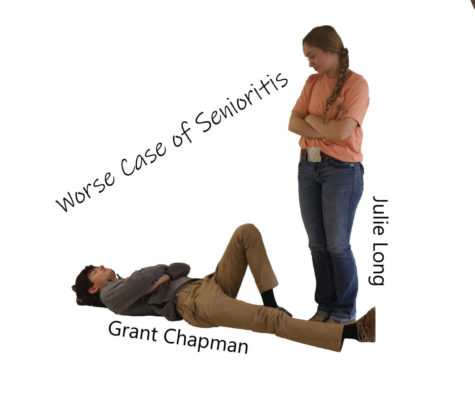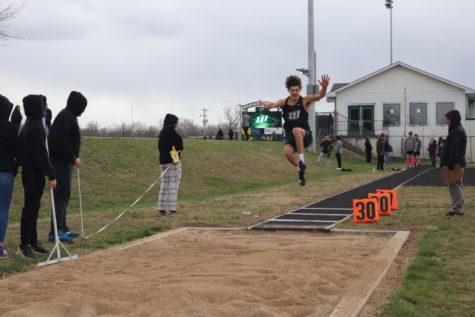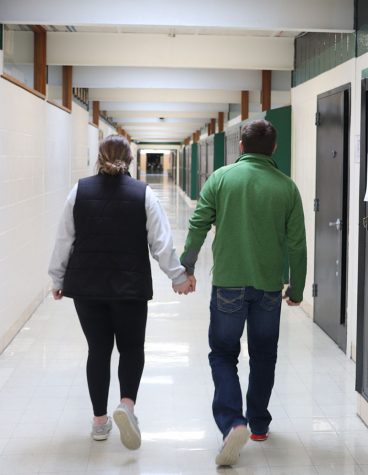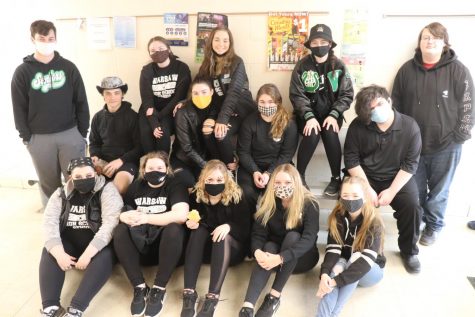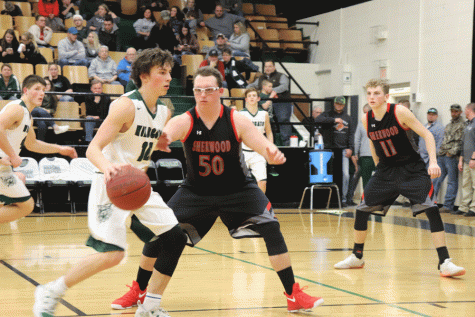Teacher and student relations
How close is too close?
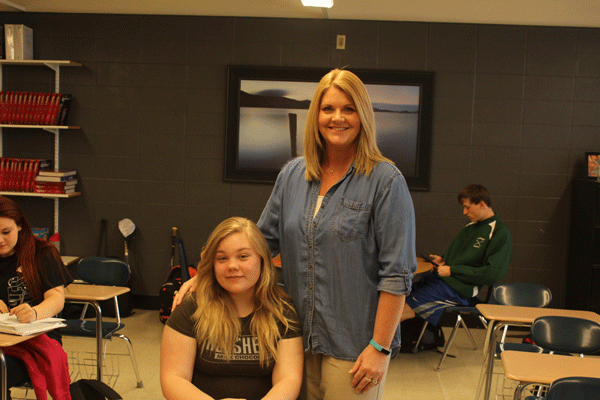
Freshman LeeAnn Rozzel and mathematics teacher Jowell Roellig portray a perfect student/teacher relationship. Roellig taught Rozzel algebra last year and Rozzel still thinks of her as a go -to mentor.
Every day for 180 days a year, students and teachers interact at school. They might sometimes develop close relationships, but teachers, administrators and students say there is a clear line of professionalism that must be maintained. But how do they think of each other? What is the relationship between teacher and student?
Math teacher Jowell Roellig believes there should be a distinct line between students and teachers.
“It is okay to be there for your students in times of crisis and uncertainty. I do not want students to be involved in my life outside of school in any way. I believe if a teacher is making separate rules for certain students, then that is too close. All students should be treated equally and follow the same rules,” Roellig said.
Students also are aware of the student/teacher relationship line.
“I think it is strictly a business relationship with teachers at school,” freshman Alexandria Young said.
“Being friends with a teacher inside of school is fine as long as it doesn’t get outside of school. Alone time is too close between teachers and students,” freshman LeeAnn Rozzel said.
According to “To Make a Friend, Ask Someone for a Favor” by Gretchen Rubin the author of The Happiness Project and writer for Psychology Today, the easiest way to make a friend is to ask for help. Somehow students are expected to keep a purely professional relationship when asking their teacher for help almost every day. Teachers are expected to do the same when helping a young person build the foundation for their whole lives.
“If teachers are friends with students, they can play favorites” senior Destiny Pearson said.
“Students and teachers can work together and become very close, but there is a line between them that cannot be crossed. Students have to realize that teachers care about them and want to see them succeed. At the same time, teachers must behave and conduct themselves in a professional manner,” principal Randy Luebbert said.
Many times, keeping that line between teacher and student can be tricky. Many teachers communicate with students over text, email and even social media. Even though the principal does not look upon it favorably there are some teachers that need to stay in contact with students outside of school for various reasons. Roellig gives her number to all of her students in case they need help with their homework. Some coaches may be friends with players on Facebook merely because that is the easiest way to reach the student outside of school if there is a change in schedule.
In the article “Social Media, Public School, Teachers and the First Amendment” published in the North Carolina Law Review, Mary-Rose Papandrea of Boston College Law School, describes a situation in which a teacher is threatened with suspension because a student saw something inappropriate on Facebook, that the teacher was doing while she was vacationing. Because of these instances, some states have banned teacher/student electronic communication unless it is through school-provided technology.
“I friend some of my students that play ball for me, but it’s not for private interactions it’s to get an idea of what they do in their spare time and to make sure they are making the right choices. If one of my players was posting inappropriately I would have a sit-down with them about how it’s a reflection on themselves and the program,” science teacher and coach Jason Ollison said.
“I don’t think teachers and students should be friends on Facebook unless the student has graduated,” Pearson said.
“Most students are not able to have their parents help them with algebra and many do not have internet access to the extra resources at home. Therefore, I give all my students my cell phone number if they need help at home. I know most students will just skip doing their homework if they are not sure what they are doing or get frustrated and give up. My students just send me a picture of the problem and then I will solve it and send a picture back to them walking them through the steps.” Roellig said.
There may be a barrier between student and teacher relations, but there may be a time when a teacher should get more involved in a student’s life. When a teacher observes that in a student’s home life there may be abuse or neglect they are obligated to do something about it.
“Part of being in education means that we are mandated reporters. What that means is if we know of or suspect any type of abuse or neglect of any of our kids then we by law have to report that. We typically hotline them to DFS or to the juvenile department,” Luebbert said.
“I think a teacher should get more involved in a student’s life if the student is struggling and needs tutoring or their homelife is unsatisfactory. Some students need extra help so involvement is important to them as long as it doesn’t get too private,” Rozzel said.
“Teachers must be very aware when they meet with students, where they meet with students, and teachers should never meet with students outside the school setting unless a parent/guardian is aware and it has an education or school related purpose. The exception to this are coaches, sponsors, and fine art directors who work with kids in the evenings or weekends. Teachers are always put under a microscope for anything they do, it is the nature of working with kids. Teachers always have to conduct themselves as professionals and make sure they never put themselves into a situation that could be misconstrued in any way,” Luebbert said.
Caption for Picture: Freshman LeeAnn Rozzel and mathematics teacher Jowell Roellig depict an ideal teacher/student relationship. Roellig taught Rozzel algebra last year and Rozzel still thinks of her as a go-to mentor.
According to the article “More Teachers Are Having Sex With Their Students, Here’s How Schools Can Stop Them” with the rise of social media, more teachers and students are having inappropriate relations.
Many colleges and educational institutions have developed policies for student-teacher relationships.
said.http://www.saic.edu/media/saic/pdfs/faculty/Policy-on-Consensual-Faculty-Student-Relationships.pdf
http://lawdigitalcommons.bc.edu/cgi/viewcontent.cgi?article=1393&context=lsfp
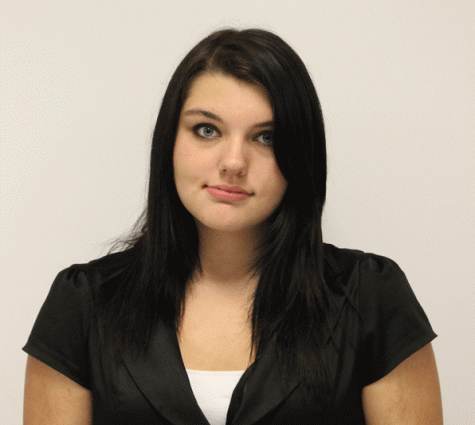
Deanna Alta Mae Garroutte is now in ninth grade. This is her first year writing for The Wildcat. Garroutte has always attended the Warsaw school district...



